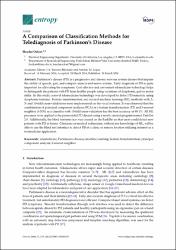A Comparison of Classification Methods for Telediagnosis of Parkinson's Disease
Citation
ÖZKAN, Haydar. "A Comparison of Classification Methods for Telediagnosis of Parkinson's Disease." Entropy, 18.4 (2016).Abstract
Parkinson’s disease (PD) is a progressive and chronic nervous system disease that impairs
the ability of speech, gait, and complex muscle-and-nerve actions. Early diagnosis of PD is quite
important for alleviating the symptoms. Cost effective and convenient telemedicine technology helps
to distinguish the patients with PD from healthy people using variations of dysphonia, gait or motor
skills. In this study, a novel telemedicine technology was developed to detect PD remotely using
dysphonia features. Feature transformation and several machine learning (ML) methods with 2-,
5- and 10-fold cross-validations were implemented on the vocal features. It was observed that the
combination of principal component analysis (PCA) as a feature transformation (FT) and k-nearest
neighbor (k-NN) as a classifier with 10-fold cross-validation has the best accuracy as 99.1%. All ML
processes were applied to the prerecorded PD dataset using a newly created program named ParkDet
2.0. Additionally, the blind test interface was created on the ParkDet so that users could detect new
patients with PD in future. Clinicians or medical technicians, without any knowledge of ML, will be
able to use the blind test interface to detect PD at a clinic or remote location utilizing internet as a
telemedicine application.



















